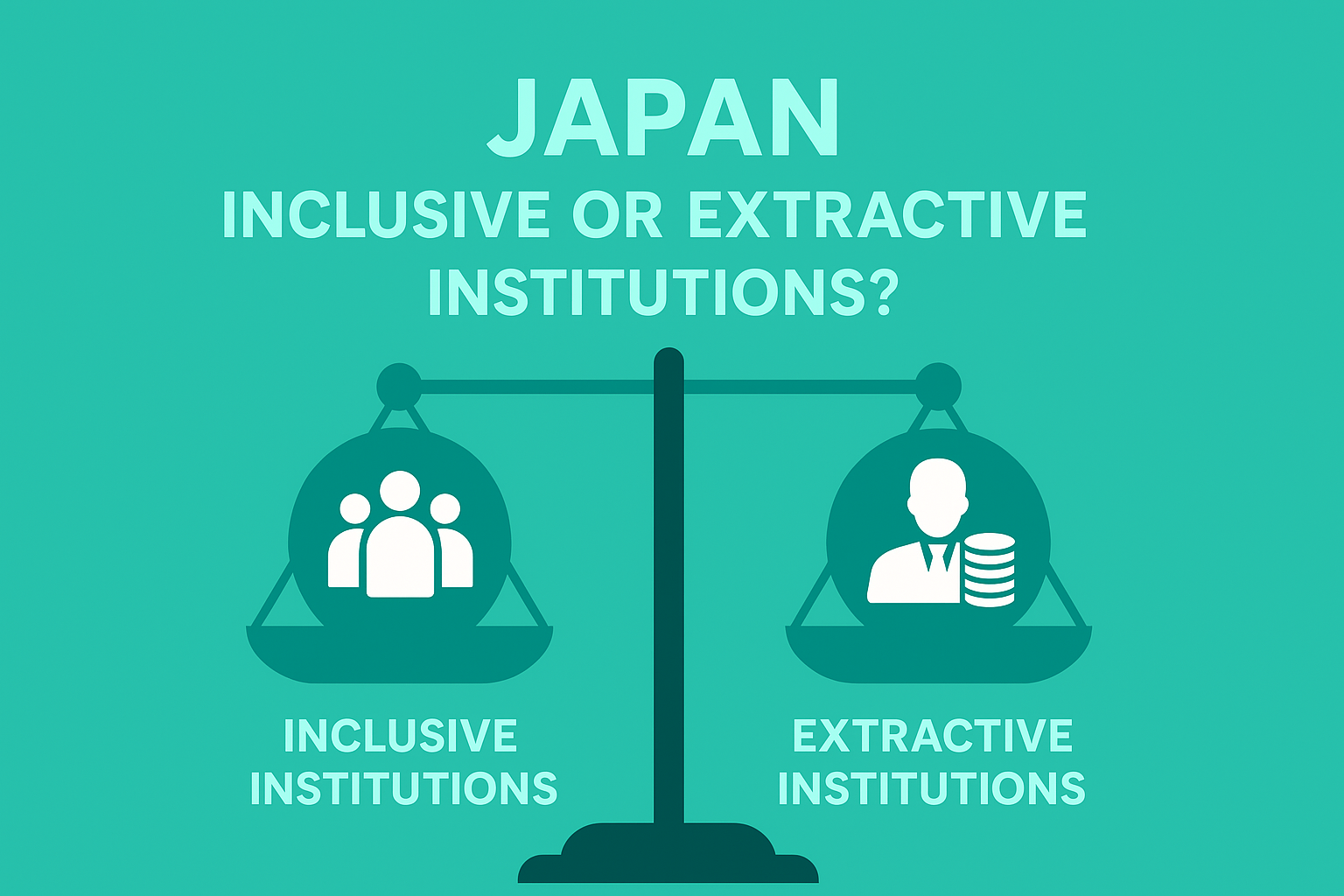Japan’s Economic and Political Systems: A Daron Acemoglu-Inspired Analysis of Inclusive vs. Extractive Institutions
Introduction
In his book Why Nations Fail, Professor Daron Acemoglu argues that the prosperity or failure of nations is primarily determined by their political and economic institutions. According to his theory, nations thrive when they have “inclusive institutions” that allow broad participation and opportunities for all, while “extractive institutions” that concentrate power and wealth in the hands of a few lead to stagnation and collapse. In this article, we will analyze Japan’s current economic and political system through the lens of Acemoglu’s theory, examining both its strengths and challenges.
The Strength of Japan’s Inclusive Institutions
Professor Acemoglu emphasizes that the key to economic prosperity lies in inclusive political and economic institutions. Japan is often considered to have strong inclusive institutions in many respects. Its education system, healthcare access, labor market, and social welfare programs all provide equal opportunities to its citizens, fostering social stability and economic growth.
For example, Japan’s education system is highly developed and provides widespread access to quality schooling. The public healthcare system is another example, with universal access to medical care ensuring that people from all socio-economic backgrounds can receive treatment. These institutions align with Acemoglu’s concept of “inclusive institutions,” which are necessary for long-term prosperity and national stability.
Emerging Signs of Extractive Institutions and Challenges
While Japan’s institutions are largely inclusive, there are emerging signs of extractive tendencies. Acemoglu’s theory warns that if economic opportunities become concentrated among a small elite, the nation’s growth potential becomes limited. This phenomenon is evident in Japan’s rising income inequality, youth unemployment, and the increasing prevalence of non-regular employment.
- Non-Regular Employment: A growing number of young people and women in Japan are employed in non-regular, low-wage jobs, which offer fewer benefits, job security, and opportunities for advancement. This is a clear indication of economic exclusion, where a segment of the population does not have access to the same economic opportunities as others. This trend of economic exclusion can hinder the nation’s long-term growth by reducing social mobility and economic dynamism.
- Aging Society and Social Welfare Burden: Japan’s rapidly aging population is placing increasing strain on the country’s social welfare systems. As the number of retirees rises, the burden on working-age citizens to support pension and healthcare systems increases. This intergenerational inequality could exacerbate social divisions and erode national cohesion, contributing to economic stagnation.
The Influence of the Elite and Political Exclusion
Acemoglu argues that one of the key factors in the collapse of nations is the influence of political elites who prioritize their own interests over the well-being of the broader population. In Japan, there is a tendency for certain industries and political leaders to secure advantages for themselves, often at the expense of the general public.
For example, political decisions often favor large corporations, particularly those in the automotive, energy, and agriculture sectors, which have historically been able to influence government policies. This tendency for economic elites to protect their interests at the expense of broader societal benefits is a characteristic of “extractive institutions,” which ultimately prevent national development and stability.
Corruption and Institutional Rigidity
Japan is generally considered to have low levels of corruption, but issues with political donations, opaque financial flows, and the influence of business interests in politics have occasionally raised concerns. As Acemoglu points out, when elites use their influence to maintain a system that benefits them while excluding others from power and opportunity, it can lead to corruption and institutional decay. This process, over time, undermines the legitimacy of the state and hampers the country’s potential for sustainable development.
The Path Forward for Japan: Strengthening Inclusive Institutions
For Japan to maintain its long-term economic growth and political stability, it must strengthen its inclusive institutions, as Acemoglu advocates. Key areas for reform include addressing youth unemployment, expanding opportunities for non-regular workers, and restructuring the social welfare system to ensure that all generations are treated fairly.
Furthermore, political reforms are necessary to ensure that the interests of the broader population are prioritized over those of political elites. In particular, measures to reduce the influence of vested interests and foster more transparency and accountability in government are essential for ensuring that Japan’s political system remains inclusive and responsive to the needs of its citizens.
Conclusion
Based on Acemoglu’s theory of inclusive and extractive institutions, Japan stands at a crossroads. While it has built a relatively inclusive political and economic system, emerging trends of economic exclusion, political influence by elites, and institutional rigidity present serious challenges. To ensure continued prosperity and stability, Japan must focus on reinforcing its inclusive institutions, addressing social inequality, and reducing the influence of elites on policymaking. By doing so, Japan can maintain its position as a prosperous and stable nation in the future.


